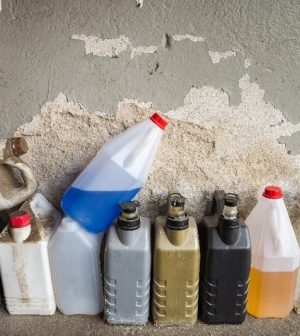- FDA Says First Round of Tests Show No Live Virus in Pasteurized Milk
- King Charles Returns to Duties After Cancer Treatment
- Biden Administration Delays Menthol Cigarette Ban
- Blood Test Might Predict Knee Osteoarthritis Years Early
- Dogs Can Get Lyme Disease, Too
- Spinal Cord Injury Damages Metabolism, and Scientists Now Know Why
- Syphilis Is Increasingly Displaying Atypical, Severe Symptoms
- Climate Change Could Be Good News for Viruses Like COVID
- Vaccines Have Saved 154 Million Lives, Mostly Babies, Over Past 50 Years
- Scientists Discover Cause of Rare Movement Disorder
Chemicals Stored in Your Garage Could Raise Odds for ALS

Volatile and toxic chemicals commonly stored in garages can increase the risk of amyotrophic lateral sclerosis (ALS).
Gasoline or kerosene, gas-powered equipment and lawn care chemicals represented the top three risk factors for ALS found in garages, researchers report.
Exposures to each of these increased ALS risk around 15%, results show.
Other chemicals found in garages that significantly increase ALS risk include pesticides, paint and woodworking supplies, researchers said.
These risks were more prominent in homes with attached garages. The flow of air from attached garages into the living space is likely behind this, researchers said.
“Especially in colder climates, air in the garage tends to rush into the house when the entry door is opened, and air flows occur more or less continuously through small cracks and openings in walls and floors,” said senior researcher Stuart Batterman, a professor of environmental health science at the University of Michigan School of Public Health.
“Thus, it makes sense that keeping volatile chemicals in an attached garage shows the stronger effect,” Batterman added in a university news release.
The most modern building codes tackle this problem by specifying measures to reduce or eliminate these air flows, Batterman added.
For the study, researchers assessed chemical exposures in the homes of more than 600 people with and without ALS. The degenerative disease affects the ability of the brain to control muscles in the body.
They found that, overall, the storage of chemicals is significantly associated with ALS risk.
The new study was published recently in the journal Amyotrophic Lateral Sclerosis and Frontotemporal Degeneration.
This finding jibes with earlier studies that found higher concentrations of pesticides in the blood of people with ALS, and also linked pesticides to worse survival odds for ALS, researchers said.
“With each study, we better understand the types of exposures that increase the risk of developing ALS,” said senior researcher Dr. Eva Feldman, director of the ALS Center of Excellence at the University of Michigan.
“We now need to build on these discoveries to understand how these exposures increase ALS risk,” Feldman added.
More information
The ALS Association has more on risk factors for ALS.
SOURCE: University of Michigan, news release, April 2024
Source: HealthDay
Copyright © 2024 HealthDay. All rights reserved.










